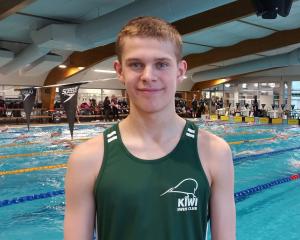
But don't ask him to explain the intricacies of the curve ball, or to identify the best moment in an inning to attempt to steal a base.
Holloway (61), a senior partner in Dunedin law firm Downie Stewart, has been chairman of Softball New Zealand since July, but he has taken the path less travelled to get to the top.
''I never played the sport. I'm really sad I didn't play, because it's a great sport. And I'm sure I couldn't have been any worse at it than I was at cricket or tennis.
''It's a huge disadvantage, that lack of in-depth institutional knowledge. I didn't play, and really only followed it at senior reserve level for three or four years.''
Following his son, Charlie, through teeball and softball introduced Holloway to the sport. He later became manager of the Otago under-17 team, and was shoulder-tapped by operations manager Jill Johnson for a place on the Otago Softball Association board.
''Jill dragged me on to the Otago executive five years ago to help co-ordinate the process of getting the DCC on board to provide us with some permanent facilities,'' Holloway recalled.
''Then they needed a new chairman. There was a great deal of people sticking thumbs on foreheads, and I was just a bit slow off the mark. So I became chairman.''
Johnson then put Holloway's name forward for a place on the Softball New Zealand board.
''The national association had gone through a bit of trauma. A bit of bloodletting, a special general meeting, people falling on their swords - it was all a wee bit messy.
''A vacancy appeared on the board and Otago and Canterbury nominated me.''
As Otago did, SNZ quickly found itself in need of a new chairman. And just like that, the bloke from Dunedin who had barely set foot on the diamond found himself in the top job.
It has been a rollercoaster ride for the national organisation but Holloway believes it is tracking well now.
A new chief executive, Tony Giles, was appointed in November. There was an improvement in morale, lines of communication were better, and things seemed to be more transparent.
For softball, the battle to retain playing numbers and boost the profile of its top teams, particularly the world champion Black Sox, remains ongoing.
''Softball has always been, particularly down south, perceived as the poor cousin in summer,'' Holloway said.
''It's actually a brilliant product. I went to Saskatoon for the world champs three years ago.
"An editorial in the programme had all these comparisons between softball and baseball in terms of required reaction time, average runs per inning, the time of a game - and softball was out in front.
''Profile has been difficult. The Black Sox just haven't played much in New Zealand. Television coverage has been virtually non-existent.
''It was a huge breakthrough to get live coverage of the World Series last year. The game against Australia had huge support.''
Sky has just announced plans to televise the series between the Black Sox and Australia at the end of the month.
Participation numbers in softball are not what they were in the 1980s and 1990s, but Holloway pointed out other sports had also found it increasingly difficult to hold on to players.
There was a lot of drop-off in the transition from teeball to softball, possibly as some players ran out of patience waiting for pitchers to get the ability to deliver the ball over the plate.
Modern sports organisations are all about visions and mission statements, and Holloway has given some thought to where he wants softball to head.
''It sounds silly but what I want is a happy softball community,'' he said.
''If people enjoy being involved, it feeds and it grows. It doesn't sound like an audacious goal but it's a fairly important building block.
''Happiness comes from clubs and associations feeling part of the national body. They're getting feedback, they know what head office is doing.
''It's also about increasing the profile of our elite teams.''
Another big question is how to manage the threat - real or perceived - of a brash cousin making inroads into softball.
Holloway has mixed feelings about baseball and its attempt to boost its profile in New Zealand.
''If you look at it with a very local focus, you could say baseball is the arch-enemy. They are trying to pinch our players.
"They have a quite charismatic and loud North American who is their CEO. He holds out this carrot of a pathway to the major leagues, but that is quite simply a myth. Playing club baseball in Auckland is not going to get you to the major leagues.
''Baseball has a view of its importance which is not in line with player participation numbers. It's in some high-decile schools in Auckland. Softball still suffers from a public perception of being a bit rough, a low-decile sport.
''Internationally, New Zealand softball is out on its own, possibly with Canada, the US and Australia. No-one else really cares about fastpitch men's softball.
''The big focus is on the combined presentation for Olympic representation, which is men's baseball and women's softball.
''I guess softball's position is that it needs to work with baseball, but it doesn't want to lose control of its own destiny.''
Holloway is also a keen rugby man.
He is a life member of the Zingari-Richmond club, having served as a coach and administrator for decades, and only hung up his boots at the age of 58, after 51 seasons playing across the grades.












